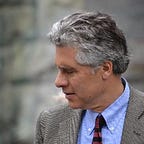Bending the Arc of History: MLK, Human Choices and The Dilemma of Progress
“The moral arc of the universe is long, but it bends toward justice.” The quote from Martin Luther King, Jr. is catchy and often cited. It is said to have been one of President Obama’s favorites. But it raises more questions than answers: Is there really an arc, moral or otherwise, to the story of the universe or, for that matter, of human affairs? And what do we mean by “moral” and by “justice”? And who, if the arc bends, is able to bend it and how?
Dr. King’s powerful rephrasing originated with Theodore Parker, a Boston Unitarian minister, a transcendentalist, an abolitionist and compatriot of Emerson, Alcott and Thoreau. Parker, by the way, is also the source of Lincoln’s closing phrases at Gettysburg seeking a union “of the people, by the people, and for the people.” So, not exactly a slouch.
Parker’s original was not as pithy as King’s, but hints about the how and why. He wrote, “I do not pretend to understand the moral universe. The arc is a long one. My eye reaches but little ways. I cannot calculate the curve…by experience of sight. I can divine it by conscience. And from what I see I am sure it bends toward justice.”
Parker tackles two big issues in the King quote. First, how do we define the destination? He does not even “pretend to understand the moral universe,” it cannot be calculated empirically. And while he is certain that it “bends toward justice” he does not assume that bend is automatic. It is a matter of human “conscience.” He clearly suggests that both the destination and the bending is up to us, however imperfectly we sense it. We cannot sit by and expect the universe to do our work for us. Dr. King, of course, was of the same school, as is made clear by his work and life.
So what, you may ask, do the ruminations of a 19th century preacher, or even a 20th century icon, have to do with us and our current moment? Simply that the arc of history is in our hands. We are the masters of our own fate. We choose the destination. We drive the bus.
This is true now more than at any time in history. Human mastery of the physical world extends far beyond our needs for adaptation and survival, beyond harnessing energy and matter, deep into the very make-up of matter itself. Far beyond the tides of the earth and moon to the very edges of the universe. We use reason and science to solve earthly problems and in the process create tools whose power is often beyond our understanding or control. Science and reason can be our deliverance or our demise.
In “Sapiens,” Noah Yuval Harari, writes deeply about the arc of human history that lies ahead. His “big four” challenges, nuclear war, climate change, genetic engineering and artificial intelligence, all are examples of our own technology run amok. Welcome to the Anthropocene. As Steward Brand said in the Whole Earth Catalogue, “We are as gods and might as well get good at it.”
This, then, is the dilemma of progress. Our mastery of the world proceeds apace without regard to human thriving. Technology can be used for good and evil. Markets know the cost of everything and the value of nothing. Our democratic systems are all too easily manipulated by the greedy, the power hungry, and the shameless. These systems have no morality except that which we provide.
Parker and King would remind us that our aims are ineffable, distant, and incalculable. They suggest we consult our conscience to discern them. These are human values, nothing less than the essence of our humanity, in all likelihood beyond the reach of our deepest science.
Our mission, should we choose to accept it: explore the source of those values, and learn to tap that source more effectively to bend the arc of progress.
